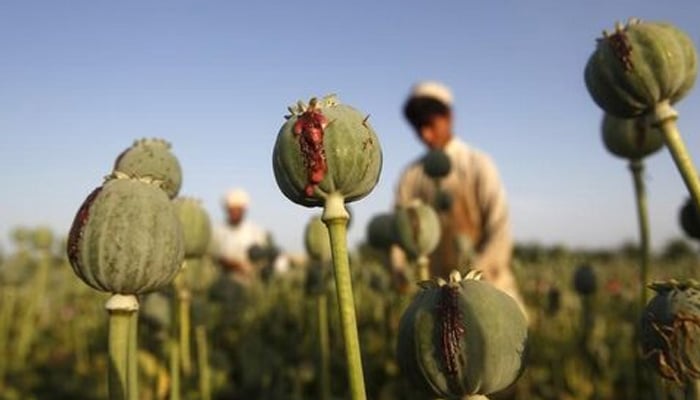
- Poppy cultivated in Pastwari and Kochmina across 25 acres.
- 40 militants, including wanted terrorists, involved in poppy farming.
- Online opium sales fund terrorism, pose national security threat.
A significant poppy farming operation has been uncovered in Khyber Pakhtunkhwa’s Dera Ismail Khan and the neighbouring border regions of Balochistan, The News reported on Monday.
This discovery has sparked major concerns about the connection between drug trafficking and terrorism in the country.
Credible sources revealed that the poppy is being cultivated particularly in the Pastwari and Kochmina areas. The approximately 25 acres of poppy cultivation — spread across 4 to 5 patches — has yielded an estimated 500 kilogrammes of opium, valued at around Rs1.6 billion.
However, the Khyber Pakhtunkhwa claims no such reports have surfaced, and even the Anti-Narcotics Force (ANF) has not reported any poppy cultivation in KP’s territory.
“We have not received any information from any agency on this issue, but the department has been instructed to investigate the matter. It may be in the Balochistan area,” an official of the KP government said.
Credible sources indicate that at least 40 militants, including wanted terrorists named Tariq Kalachi and Habib Ur Rahman, have established hideouts in the region, with more terrorists arriving. Local sources also revealed that Afghan labourers are engaged in poppy cultivation, allegedly working under the financial patronage of the terrorist faction known as the “Faizullah Ikhwani Group”.
Sources claim that a particularly alarming development is the online sale of opium harvested from these fields. Reports suggest that these funds finance terrorist activities in Pakistan, posing a significant threat to national security.
The United Nations Office on Drugs and Crime (UNODC) had confirmed a sharp decline in Afghanistan’s opium production until 2023. However, recent trends indicate a resurgence in drug cultivation, prompting traffickers and militant groups to seek alternative sources, with Pakistan’s border regions emerging as a new hub for narcotics production.
Security sources told this correspondent that immediate governmental intervention is imperative to curb this escalating crisis.
A comprehensive counter-narcotics strategy is required to dismantle these illegal operations and cut off financial resources for terrorist networks. The ANF, in collaboration with civil administration and law enforcement agencies, must conduct coordinated operations to clear affected areas and dismantle illicit networks.
“A decisive crackdown on this drug-terrorism nexus is essential not only for Pakistan’s internal security but also for regional stability. Failure to act swiftly may allow these criminal networks to strengthen their foothold and increase internal security threats for Pakistan,” the official said.


